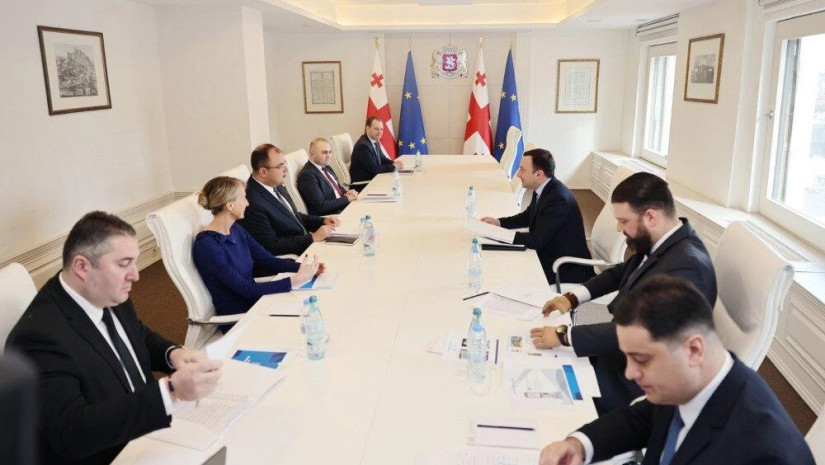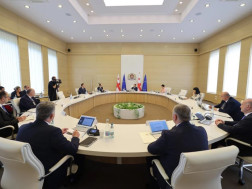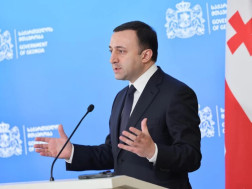Georgian Prime Minister Irakli Garibashvili held a working meeting with Justice Minister Rati Bregadze and his Deputy Ministers.
The Justice Ministry’s plans for 2023 were discussed at the meeting. The Head of Government was briefed by the Justice Ministry’s senior management on all activities planned by the Ministry for implementation this year.
It was pointed out at the meeting that three key directions: protection of human rights, ensuring the country’s legal security, and affordable services for citizens remain the Justice Ministry’s priorities.
In terms of state services, special attention was paid to such projects launched in 2022 as systemic land registration and systemic addressing.
Under systemic land registration, the state, based on a preliminarily developed plan/timetable, will measure and register land lots free of charge for citizens in 59 municipalities. Since the launch of the project, 187,720 parcels of land (57, 151.26 hectares) have been measured within the scope of fieldworks, also 95, 617 parcels of land (39,420.6 hectares) have been registered under systemic registration, and 15,833 parcels of land (4,902 hectares) have been registered under sporadic registration.
Systemic registration will be finalized at the end of 2024. As a result of this project, not only previously unregistered parcels of land will be registered, but overlaps/overlays in land lots registered years ago will also be corrected, owners will be identified, parcel boundaries will be determined, disputes will be reduced/prevented, and registered immovable properties will be used in economic circulation.
Systemic addressing will be finalized in 2024. Under the project, 78% of previously unaddressed settlements will be assigned addresses across the country, namely street formation, assigning numbers of all immovable assets, and assigning addresses to immovable assets in the Register of Rights. The unified electronic database of addresses will be provided to relevant organizations (police, emergency services, postal services, and others). In addition, the boundaries of municipalities and settlements will be specified.
At the meeting, the Prime Minister was also briefed on the implementation of the 2022-2025 Service Development Strategy approved by the Government in 2022. The strategy envisages the development of a unified standard of the creation, delivery, quality assurance, and pricing of state services, and the subsequent delivery of state services to the population in line with this unified standard. Various agencies are actively cooperating on the introduction of the strategy, and it is planned for seven select state agencies to be guided by the unified standard in the service delivery component at the end of this year.
During the conversation, measures carried out by the Ministry of Justice in relation to the implementation of the new Law on Entrepreneurs were underlined. The Ministry of Justice has adopted a service fitting in with the new law, and is holding an active awareness campaign to help entrepreneurs fulfil their obligations imposed by the law, which implies bringing the data registered by the end of 2023 in concordance with the new law.
The Prime Minister was also provided with a report on enhancing access to notary services. In 2022, the age limit for serving as a notary was increased, also the number of notaries grew, and so did the geographic area of notary bureaus. As for innovations in this direction, it is planned to strengthen cooperation within the scope of the memorandum signed with Germany, also to introduce notary retraining courses, cooperation with research centers, and others.
It was emphasized at the meeting that the Ministry of Justice plans to switch to higher-quality next-generation identification documents in the nearest future, in this way meeting the highest modern standards of security. A new digital signature, so-called Mobile ID, will be introduced, and the digital public service hall application will be launched.
The conversation touched on the construction of public service halls. In 2023, new public service halls will open in Zestaponi, Samtredia, Akhmeta, and Khashuri. Construction work will commence in Khelvachauri, Tsaishi, Tolebi, Zoti, Sachkhere, Shrosha, Mtskheta, Sagarejo, Gldani. The scope of mobile public service halls will expand, their number will increase to twenty, and this innovative service will be available in every region of Georgia.
In 2023, the Ministry of Justice will continue introducing innovative services, including new projects by the Public Service Hall: Personal Assistant, Smart Self-Serve Space, and Artificial Intelligence in Telephone Services. It is planned to open the Hologram Museum of Law. Projects for Electronic Assistant and a rent/lease agreement monitoring system will be introduced in the National Bureau of Enforcement.
The management of the Ministry of Justice pointed our that, compared to 2020, the budget of the Ministry of Justice has in fact doubled. For example, if it made up 389,626,000 GEL (budget: 238,813,000 GEL, own: 150,813,000 GEL) in 2020, it is now 758,800,000 GEL (budget: 392,400,000 GEL, own: 366,400,000 GEL) in 2023. The Minister and Deputy Ministers of Justice thanked the Prime Minister for this support.
The conversation touched on the probation system, with emphasis on implemented reforms with PROBBOX as their most important segment. The Confederation of European Probation (CEP), in its article, praised PROBOX as a European-scale innovation. At the working meeting, the draft Probation Code was discussed, which, similar to the Penitentiary Code, will offer a series of innovations and benefits to probation system employees, probationers, and other beneficiaries of the LEPL. Emphasis was placed on the newly introduced electronic case management system for convicts with suspended sentences and ex-convicts that plays a crucial role in the streamlined and fast operation of the LEPL.
A plan for opening nationwide new spaces for diversion/mediation and juvenile referral was presented.
In order to introduce 1st-, 2nd-, and 3rd-level prevention, a new project was discussed: an online crime prevention course for teachers and a probationer orientation course. It was noted that, this year, the beneficiaries of the National Agency for Crime Prevention, Enforcement of Non-Custodial Sentences and Probation will use the PROBAPP mobile application enabling them to enjoy agency-related services from home. The conversation touched on the role of the RE-MARKET shop in the process of resocialization of inmates, and the opening of two new stores in Kutaisi and Batumi was announced.
Innovations in the sphere of archive services were discussed. This year, the construction of the Shida Kartli Regional Archive’s building and the designing of the Mtskheta-Mtianeti Regional Archive’s building will start.
At the meeting, the penitentiary system’s priority of replacing large semi-open penitentiaries with smaller ones. To this end, a penitentiary for up to 700 inmates will open in Laituri.
To ensure access to higher education and improve its quality within the system, this year, within the framework of the innovative Digital University educational project, it is planned to expand digital teaching to encompass other penitentiaries as well. Sports festivals in various sports will continue. To this end, sports facilities in penitentiaries have been reconstructed/rehabilitated, and it is planned to furnish them with full sets of equipment.
At the meeting, caring for the employees of the Special Penitentiary Service and improving their working conditions was singled out as one of the key directions. To this end, beginning on January 1, 2023, employees working 8-hour shifts are provided with one free meal a day, while 24-hour shifts include three free meals per shift.
Special emphasis among the plans for the future was placed on improving the living conditions of inmates and on increasing the numbers of employed inmates and rehabilitation programs. It was noted that the development of a concept of release preparation is planned.
At the meeting, launching the designing/construction of smaller penitentiary facilities, designing plans for installing fire safety systems and introducing modern security systems in every penitentiary facility, also designing plans for meeting the needs of such facilities were also discussed.
It was noted that detainees/convicts in the penitentiary system are registered using the new OIS program. The new OIS program is a flexible information system that allows for not only collecting exhaustive information on each inmate, but also for extracting and processing statistical and analytical data.
At the meeting, activities planned in the direction of legislative work were discussed. It was noted that, in 2023, it is planned to adopt the new Penitentiary Code that will improve the working conditions of the employees of the Special Penitentiary Service and the legal status of persons in penitentiary facilities. For example, detainees will be entitled to longer visits, all types of visits will be absolutely free of charge, everyone-except for high-risk convicts-will be entitled to higher education, the living conditions of detainees and convicts will be equalized, every unit of the Penitentiary Service will be granted a special status to equalize and improve the conditions of all employees, the circle of holders of special ranks will expand, and the employees, besides occupation- and rank-based salaries, will enjoy supplementary wages based on years in service.
The active process of translating legal acts into the Abkhazian, Ossetian, and other ethnic minority languages and their posting on the website of the Legislative Herald will continue. In particular, it was noted that presently a total of 60 translated normative acts are available, while their number is expected to grow to 100 by the end of 2023.
The development approaches based on scientific findings and deep analysis in the legislative process will remain a priority. To this end, cooperation with schools of higher education and the National Academy of Sciences of Georgia will continue. In addition, active work will be carried out within the format of the Scientific Advisory Council of the Ministry. In addition, in 2023, it is planned to publish four new issues of Justice Magazine and to launch a new online platform for legal discussions.
To promote public engagement in the work of the system of the Justice Ministry, projects designed to strengthen the protection of human rights, introduce innovative services, and cement legal security will continue.
At the meeting, the importance of constant retraining of the employees of the Ministry’s system was underscored, and information was presented on new learning programs. Special attention was paid to the opening of a new learning facility for the employees of the Penitentiary Service.
Another innovation of 2023 lies in the launch of the operations of the Justice Studio. This studio will serve as a professional media outlet for lawyers. It will promote the profession of a lawyer, foster raising legal awareness, and enhance public engagement in legal discourse.
Special attention was paid to protecting the country’s interests in international courts. Since Georgia has won every dispute against Russia in the Strasbourg and Hague Courts, active work will be carried out to ensure the effective enforcement of the decisions of international courts.
Emphasis was placed on the drastic downward trend of complaints filed against Georgia with the Strasbourg Court. In particular, as of 2023, only 155 complaints against Georgia are being reviewed by the Strasbourg Court, which is Georgia’s historic low throughout its history of Council of Europe membership. For comparison, in 2009-2012, the European Court reviewed between 3,000 and 4,000 complaints lodged against Georgia. The obvious decrease of complaints in the international court is an illustration of the reforms carried out by the Georgian Government since 2012 in the field of justice, as a result of which the population of Georgia has regained trust in state institutions, and now Georgian citizens can protect their rights at home, in their own country.
The active process of protecting national interests in the international courts of arbitration continues. This year, priority is given to the enforcement of the decisions on three disputes won last year, as part of which the state avoided 330 million GELs’ worth of losses and gained a right to a 187-million-GEL compensation. On the other hand, executing agreements with honest investors will continue, within the scope of which public and private interests will be fairly balanced.
To further bolster the effectiveness of Georgian legislation’s alignment with EU law, in 2023, an electronic portal will be launched to reflect every EU legal act that Georgia is required to align with, and the level of harmonization will be automatically measured. In parallel to the foregoing, the Ministry of Justice will conduct a legal analysis of normative acts developed with a view to aligning with EU law.
In order to further boost sectoral cooperation in the field of justice, high-level meetings and legal forums engaging about 20 countries will be held this year. On one hand, this will promote the consolidation of support from partner countries for the process of European integration. On the other, a legal groundwork will be put in place for protecting the interests of Georgian citizens living abroad.
At the conclusion of the meeting, Georgian Prime Minister Irakli Garibashvili assigned new tasks to the Minister and Deputy Ministers of Justice.
















